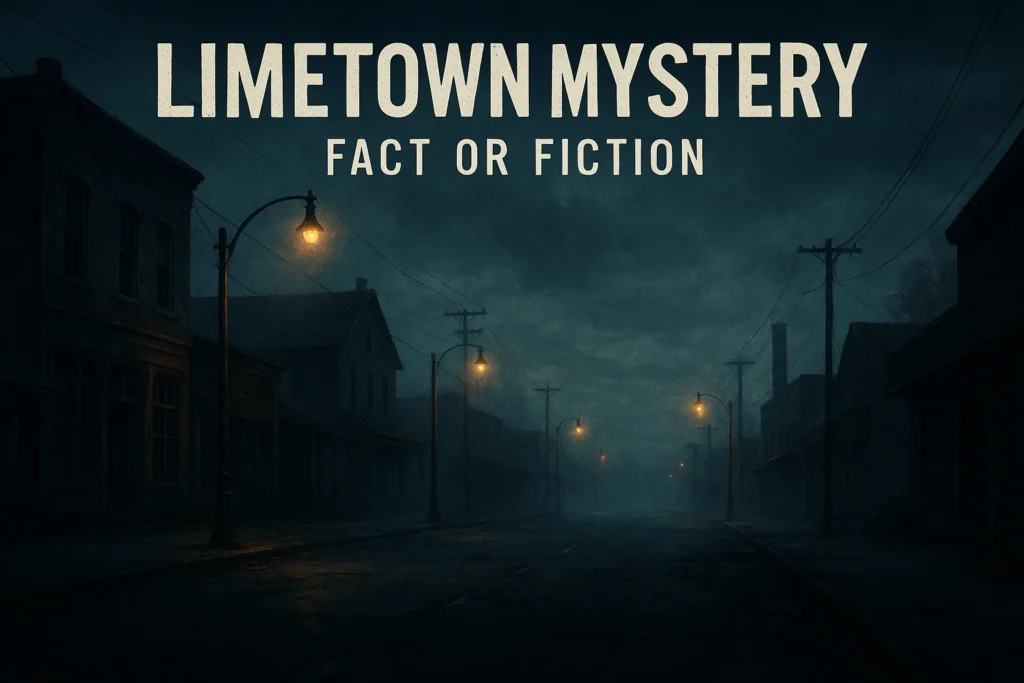
The fascination with this question speaks to something deeper: our collective interest in unsolved mysteries, forgotten places, and the stories that could be hiding just beneath the surface of history. Let’s explore the truth behind Limetown, from its podcast roots to its adaptation, cancellation, and the way it continues to spark curiosity.
What Is Limetown About?
The Podcast That Started It All
Limetown began as a podcast in 2015, created by Zack Akers and Skip Bronkie. Styled like investigative journalism, it followed Lia Haddock, a reporter trying to uncover what happened to the residents of a research community in Tennessee. The town had been designed as a hub for scientific innovation, but one day, more than 300 people disappeared, no bodies, no clues, just gone.
The podcast struck a nerve. Listeners compared it to Serial for its realism, yet its tone carried shades of classic science fiction and horror. Its sound design, voice acting, and pacing were so authentic that some people believed it might be based on real events. It was an audio mystery that thrived on one haunting question: What happened in Limetown?
From Podcast to TV Series
The success of the podcast caught Hollywood’s attention. In 2018, Limetown was adapted into a Facebook Watch series, starring Jessica Biel as Lia Haddock. Biel’s involvement brought the project into the mainstream, and fans hoped it would become a cultural phenomenon like The X-Files or Lost.
The series kept the same investigative format but brought a visual intensity that made the mystery feel even more alive. Shots of empty labs, shadowy woods, and haunting music reinforced the unsettling atmosphere. Yet for many viewers, the big question still hung in the air: was any of this true?
Is Limetown Based on a True Story?
Fiction Meets Reality
Despite its realistic style, Limetown is a work of fiction. There is no record of a town by that name vanishing in Tennessee, or anywhere else in the world. The story was carefully crafted to sound like real investigative journalism, which explains why so many listeners and viewers were drawn into its spell.
Akers and Bronkie intentionally designed it that way. They wanted the podcast to mirror true-crime storytelling while weaving in eerie science fiction elements. The blending of genres created a powerful illusion of reality.
Real-Life Inspirations Behind Limetown
While Limetown itself isn’t real, it was inspired by actual places and historical projects. According to the creators, they drew influence from research communities like Oak Ridge, Tennessee, a city built during World War II as part of the Manhattan Project. Oak Ridge was once shrouded in secrecy, and its existence was not widely known until after the war.
This parallel makes Limetown’s premise more chilling. History shows that hidden towns and secret research facilities do exist, and people are naturally fascinated by what might go on behind closed doors. That fascination fuels the story’s authenticity.
The Mystery of the Limetown Disappearance
Why Did Fans Think It Was Real?
The podcast and series both presented the Limetown case in documentary style, using “interviews,” “archival audio,” and investigative reporting techniques. This format convinced some listeners that the disappearance had really happened. Social media was full of posts asking: When did the Limetown disappearance happen?
The blending of truth and fiction has been used before, think of The Blair Witch Project or War of the Worlds. Both famously tricked audiences into believing fictional events were real. Limetown continued that tradition in the digital age.

Unraveling the Fictional Timeline
In the show, Limetown’s disappearance supposedly took place in the early 2000s. The fictional backstory painted a picture of a thriving town of scientists and their families before the event. But the entire timeline, characters, and details were fabricated. It was world-building designed to feel true without being based on actual events.
Why Was Limetown Canceled?
The Rise and Fall of the TV Adaptation
Although the podcast developed a devoted following, the TV series struggled to capture the same magic. After just one season on Facebook Watch, Limetown was canceled in 2020.
The decision surprised fans, especially since the show had big names like Jessica Biel and Stanley Tucci. But Facebook Watch was still an experimental platform at the time, and even strong content often failed to reach wide audiences.
Audience Reception and Streaming Struggles
Reviews of the series were mixed. While Biel’s performance as Lia Haddock earned praise, some critics felt the mystery was stretched too thin for television. Others believed the suspense worked better in audio form, where the imagination could fill in the gaps.
Ultimately, the cancellation wasn’t because the story lacked potential, it was more about platform challenges and the difficulty of translating podcast suspense into visual storytelling.
Is There a Book Based on Limetown?
Expanding the Universe in Print
Yes, Limetown also exists as a novel. In 2019, Akers and Bronkie collaborated with author Cote Smith to release Limetown: The Prequel to the #1 Podcast. The book explores events leading up to the disappearance, adding depth to the fictional universe.
How the Book Complements the Podcast and Series
The novel dives into character backstories and offers context the podcast couldn’t cover. For fans who were left with questions after the series was canceled, the book provided another way to engage with the mystery.
It also reinforced the feeling that Limetown could almost be real. By existing across podcast, television, and print, the story spread into multiple formats, much like true stories that dominate media coverage.
Why People Still Ask: Is Limetown a True Story?
The Fascination With Disappearance Stories
Human beings are drawn to mysteries. When a plane goes missing, when a person vanishes without a trace, or when a town has secrets, we want answers. Stories like Limetown echo real-life disappearances, from the lost colony of Roanoke to modern-day unsolved cases.
That’s why people keep asking: Is Limetown real? It speaks to our fear of the unknown and our desire to uncover hidden truths.
Blurring the Line Between Fiction and Reality
What makes Limetown unique is its ability to walk the razor’s edge between fact and fiction. It’s not a true story, but it feels like it could be. Its inspiration from real secret towns, its immersive podcast format, and its chillingly plausible premise all contribute to its lasting impact.
Even years after its cancellation, the question lingers. And maybe that’s the greatest success of all, the story continues to live in our imagination.
Final Thoughts on Limetown’s Legacy
So, is Limetown a true story? The short answer is no, it’s pure fiction. But the long answer is more interesting. Limetown succeeds because it taps into real human fears and historical truths about secret research and unexplained disappearances. It’s not real, but it feels real, and that’s why it continues to haunt people.
The podcast created an immersive mystery, the TV series gave it visual weight, and the novel expanded its universe. Even though the show was canceled, the idea of Limetown still fascinates audiences. It’s a reminder that some of the most powerful stories are the ones that make us question reality itself.

Jessica Savitch, with a deep passion for journalism, brings her expertise to istruestory.com as a dedicated author. MA in Arts & Journalism.